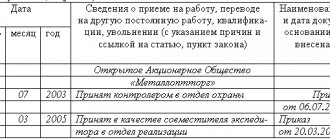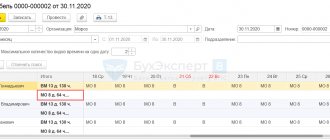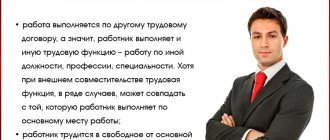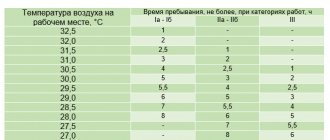Text of Article 282 of the Labor Code of the Russian Federation in the new edition.
Part-time work is the performance by an employee of other regular paid work under the terms of an employment contract in his free time from his main job.
Concluding employment contracts for part-time work is permitted with an unlimited number of employers, unless otherwise provided by federal law.
Part-time work can be performed by an employee both at the place of his main job and with other employers.
The employment contract must indicate that the job is a part-time job.
Part-time work for persons under the age of eighteen is not allowed, in jobs with harmful and (or) dangerous working conditions, if the main job is related to the same conditions, as well as in other cases provided for by this Code and other federal laws.
Features of the regulation of part-time work for certain categories of workers (teaching, medical and pharmaceutical workers, cultural workers), in addition to the features established by this Code and other federal laws, can be established in the manner determined by the Government of the Russian Federation, taking into account the opinion of the Russian Tripartite Commission for Social Regulation - labor relations.
N 197-FZ, Labor Code of the Russian Federation, current edition.
Article 282. General provisions on part-time work
Part-time work is the performance by an employee of other regular paid work under the terms of an employment contract in his free time from his main job.
Concluding employment contracts for part-time work is permitted with an unlimited number of employers, unless otherwise provided by federal law.
Part-time work can be performed by an employee both at the place of his main job and with other employers.
(as amended by Federal Law No. 90-FZ of June 30, 2006)
The employment contract must indicate that the job is a part-time job.
Part-time work for persons under the age of eighteen is not allowed, in heavy work, work with harmful and (or) dangerous working conditions, if the main work is related to the same conditions, as well as in other cases provided for by this Code and other federal laws.
(part five as amended by Federal Law dated June 30, 2006 N 90-FZ)
Features of the regulation of part-time work for certain categories of workers (teaching, medical and pharmaceutical workers, cultural workers), in addition to the features established by this Code and other federal laws, can be established in the manner determined by the Government of the Russian Federation, taking into account the opinion of the Russian Tripartite Commission for Social Regulation - labor relations.
(Part six as amended by Federal Law dated June 30, 2006 N 90-FZ)
Article 282 of the Labor Code of the Russian Federation. General provisions on part-time work
1. Labor relations of persons working part-time are regulated for the first time at the legislative level in the Labor Code. Previously, the work of part-time workers was regulated by Resolution of the Council of Ministers of the USSR of September 22, 1988 N 1111 and the Regulations on the conditions of part-time work adopted in accordance with it, approved. Resolution of the State Committee for Labor of the USSR, the Ministry of Justice of the USSR and the All-Union Central Council of Trade Unions of March 9, 1989 N 81/604-K-3/6-84. It should be noted that the very concept of “part-time work” in the Labor Code has not changed. In accordance with Part 1 of the commented article, work under an employment contract is part-time if:
- the employment contract was concluded with an employee who is already in an employment relationship with the same or another employer;
- under this contract, other work is performed in addition to the main one;
- The work performed under another employment contract is regular and paid, and this work is performed by the employee in his free time from his main job.
2. An employee has the right to enter into employment contracts for part-time work with an unlimited number of employers (Part 2 of Article 282 of the Labor Code of the Russian Federation). In this case, any permission (consent), incl. and from the employer at the main place of work, this is usually not required. The exception is cases expressly provided for by federal law. For example, according to Art. 276 of the Labor Code, the head of an organization has the right to work part-time for another employer only with the permission of the authorized body of a legal entity, or the owner of the organization’s property, or a person (body) authorized by the owner (see commentary to Article 276).
3. According to Part 3 of the commented article, part-time work can be performed both at the main place of work and with other employers. Work performed under another employment contract for the same employer is called internal part-time work; for another employer, it is called external part-time work (see commentary to Article 60.1).
The commented article allows for internal part-time work both in the same specialty (profession or position) in which the main work is performed for a given employer, and in another. In other words, an employee can work both externally and internally in any specialty, profession or position stipulated by the employment contract, incl. and the same as at the main job.
4. When concluding an employment contract for part-time work, it must, along with other conditions, indicate that the work is part-time (Part 4 of the commented article; see also commentary to Article 57). Both internal and external part-time work are formalized by an employment contract concluded in writing. In this case, the rules established by Art. 67 (see commentary to it).
By concluding an employment contract for part-time work, the employee acquires the corresponding legal status under this contract, which does not change automatically due to changes occurring at the main place of work. For example, if an employee has terminated his employment relationship with the employer at his main place of work, then part-time work does not become his main job. This conclusion follows from the content of Part 4 of Article 282 of the Labor Code of the Russian Federation, according to which the condition of part-time work is a mandatory condition of the employment contract, and Art. 72 of the Labor Code, which provides that changes to the terms of an employment contract determined by the parties are allowed only by agreement of the parties and in writing (see commentary to Article 72).
5. Part 5 of the commented article stipulates which categories of workers and under what conditions are prohibited from working part-time.
In accordance with it, in all cases, part-time work for persons under the age of 18 is not allowed.
Persons engaged in heavy work as part of their main work, work with harmful and (or) dangerous working conditions, can work part-time, provided that the work performed as part-time work is not associated with the same conditions, i.e. heavy, harmful and (or) dangerous.
Employees whose work is directly related to driving vehicles or controlling the movement of vehicles are not allowed to work part-time work directly related to driving vehicles or controlling the movement of vehicles. The list of jobs, professions, positions directly related to driving vehicles or controlling the movement of vehicles is approved by the Government of the Russian Federation, taking into account the opinion of the Russian Tripartite Commission for the Regulation of Social and Labor Relations (see commentary to Article 329).
Part-time work is not permitted in other cases if this is expressly provided for by federal law. So, in accordance with Art. 14 of the Law on Municipal Service, municipal employees do not have the right to engage in other paid activities on a part-time basis, except for teaching, scientific and other creative activities. According to Art. 21 of the Law on State and Municipal Unitary Enterprises, the head of a unitary enterprise does not have the right to be a founder (participant) of a legal entity, hold positions and engage in other paid activities in state bodies, local governments, commercial and non-profit organizations, except for teaching, scientific and other creative activities, engage in entrepreneurial activity, be the sole executive body or a member of the collegial executive body of a commercial organization, except for cases where participation in the bodies of a commercial organization is part of the job responsibilities of this manager.
6. Features of the regulation of part-time work for certain categories of workers (teaching, medical and pharmaceutical workers, cultural workers) in accordance with Part 6 of the commented article are determined in the manner established by the Government of the Russian Federation, taking into account the opinion of the Russian Tripartite Commission for the Regulation of Social and Labor Relations.
Decree of the Government of the Russian Federation of April 4, 2003 N 197 “On the features of part-time work for teaching, medical, pharmaceutical workers and cultural workers” (SZ RF. 2003. N 15. Art. 1368) established that the features of part-time work for these workers are determined The Ministry of Labor and Social Development of the Russian Federation in agreement with the Ministry of Education of the Russian Federation, the Ministry of Health of the Russian Federation and the Ministry of Culture of the Russian Federation, taking into account the opinion of the Russian Tripartite Commission for the Regulation of Social and Labor Relations.
In accordance with the above-mentioned Resolution of the Government of the Russian Federation, the Ministry of Labor of Russia adopted Resolution No. 41 of June 30, 2003 “On the peculiarities of part-time work for teaching, medical, pharmaceutical and cultural workers” (BNA RF. 2003. No. 51).
This Resolution establishes the following features of part-time work for teaching, medical, pharmaceutical and cultural workers:
a) these categories of employees have the right to carry out part-time work at the place of their main job or in other organizations, incl. for a similar position, specialty, profession, and in cases where reduced working hours are established (with the exception of work for which sanitary and hygienic restrictions are established by regulatory legal acts of the Russian Federation);
b) the duration of part-time work for the specified categories of employees during a month is established by agreement between the employee and the employer, and for each employment contract it cannot exceed:
- for medical and pharmaceutical workers - half the monthly standard working time, calculated from the established length of the working week;
- for medical and pharmaceutical workers whose half of the monthly working time for their main job is less than 16 hours per week - 16 hours of work per week;
- for doctors and paramedical personnel in cities, districts and other municipalities where there is a shortage of them - the monthly standard of working time, calculated from the established length of the working week;
- for junior medical and pharmaceutical personnel - the monthly standard of working time, calculated from the established duration of the working week;
- for teaching staff (including trainers-teachers, trainers) - half of the monthly standard working time, calculated from the established length of the working week;
- for teaching staff (including trainers-teachers, trainers) whose half of the monthly working time for their main job is less than 16 hours per week - 16 hours of work per week;
- for cultural workers involved as teachers of additional education, accompanists, choreographers, choirmasters, accompanists, artistic directors - the monthly standard of working time, calculated from the established length of the working week;
- c) the teaching work of highly qualified specialists on a part-time basis, with the consent of the employer, can be carried out in educational institutions for advanced training and retraining of personnel during regular working hours while maintaining wages at the main place of work.
According to clause 2 of the Resolution, the following types of work are not considered part-time work for the specified categories of workers and do not require the conclusion (registration) of an employment contract:
- a) literary work, incl. work on editing, translation and reviewing of individual works, scientific and other creative activities without holding a full-time position;
- b) carrying out medical, technical, accounting and other examinations with a one-time payment;
- c) teaching work on an hourly basis in an amount of no more than 300 hours per year;
- d) consulting by highly qualified specialists in institutions and other organizations in the amount of no more than 300 hours per year;
- e) supervision of graduate students and doctoral students by employees who are not on the staff of the institution (organization), as well as the head of the department, management of the faculty of an educational institution with additional payment by agreement between the employee and the employer;
- f) teaching work in the same institution of primary or secondary vocational education, in a preschool educational institution, in an educational institution of general education, an institution of additional education for children and other children's institution with additional pay;
- g) work without holding a full-time position in the same institution or another organization, incl. performance by teaching staff of educational institutions of responsibilities for managing classrooms, laboratories and departments, teaching work of managers and other employees of educational institutions, management of subject and cyclic commissions, work on the management of industrial training and practice of students and other students, duty of medical workers in excess of the monthly working hours according to graphics, etc.;
- h) work in the same educational institution or another children's institution in excess of the established norm of hours of teaching work for the wage rate of teaching staff, as well as accompanists, accompanists for the training of arts workers;
- i) work on organizing and conducting excursions on an hourly or piece-rate basis without holding a full-time position.
Carrying out the work specified in subparagraph. “b” - “h”, is allowed during regular working hours with the consent of the employer.
When applying Article 282 of the Labor Code of the Russian Federation, it should be borne in mind that the said Resolution must be applied taking into account the amendments made by Federal Law of June 30, 2006 N 90-FZ in Art. 284. In accordance with the new edition of this article, the duration of working time when working part-time is limited, as a general rule, to half the monthly norm (standard working time for another accounting period) established for the corresponding category of workers (see commentary to Article 284) .
Article 283. Documents presented when applying for part-time work
When applying for a part-time job with another employer, the employee is required to present a passport or other identification document. When hiring a part-time job that requires special knowledge, the employer has the right to require the employee to present a diploma or other document on education or professional training or duly certified copies thereof, and when hiring for hard work, work with harmful and (or) dangerous working conditions - a certificate about the nature and working conditions at the main place of work.
(as amended by Federal Law No. 90-FZ of June 30, 2006)
Commentary on Article 282 of the Labor Code of the Russian Federation
The commented article established the definition of part-time work as the performance by an employee of other regular paid work under the terms of an employment contract in his free time from his main job.
The Labor Code allows for the possibility of concluding employment contracts for part-time work with an unlimited number of employers, except in cases where this is prohibited by federal law.
In Art. 60.1 of the Labor Code states that an employee has the right to enter into an employment contract to perform, in his free time from his main job, other regular paid work for the same employer (internal part-time work) and (or) with another employer (external part-time work). As we see, in the Labor Code for the first time, internal and external part-time work are distinguished. Internal part-time work refers to work outside of normal working hours at the initiative of an employee in the same organization, but under a different contract. External part-time work is work under another employment contract with another employer. Taking these differences into account, the practice of legal regulation of part-time labor has developed.
Under all circumstances, the work performed is considered part-time if: the employee is already in an employment relationship with the same or another employer; work under a part-time employment contract is performed in addition to work that is main, regular and paid; the employee performs part-time work under another employment contract in his free time from his main job. The employment contract must indicate that the work is performed part-time.
Before the adoption of the Labor Code, the conditions for part-time work were regulated by Resolution of the Council of Ministers of the USSR dated 09/22/1988 N 1111 (as amended on 10/03/2001) <1> and Resolution of the State Labor Committee of the USSR, the Ministry of Justice of the USSR and the Secretariat of the All-Union Central Council of Trade Unions dated 03/09/1989 N 81/604-K -3/6-84 (as amended on August 14, 2001) <2>. The last to be approved was the Regulation on the conditions of part-time work. This Regulation establishes a List of works that are not considered part-time work. This List has not lost its significance with the adoption of the Labor Code. However, this Regulation and the List approved by it must be applied taking into account the Resolution of the Ministry of Labor of Russia dated June 30, 2003 N 41 “On the peculiarities of part-time work for teaching, medical, pharmaceutical workers and cultural workers” <3>, agreed with the Ministry of Education of Russia, the Ministry of Health of Russia and the Ministry of Culture of Russia and taking into account the opinion of the Russian Tripartite Commission for the Regulation of Social and Labor Relations. This Resolution of the Ministry of Labor of Russia determines the duration of part-time work for teaching, medical, pharmaceutical and cultural workers, which should not exceed:
——————————— <1> Code of Laws of the USSR. T. 2. P. 228-2; BVS RF. 2001. N 10; 2002. N 10. <2> Bulletin of the State Committee for Labor of the USSR. 1989. N 6; Bulletin of the Russian Ministry of Labor. 1994. N 1; BNA. 1994. N 2; BVS RF. 2000. N 5. <3> BNA. 2003. N 51.
- for doctors and paramedical personnel in cities, districts and other municipalities where there is a shortage - a monthly standard of working time, calculated from the established length of the working week. At the same time, the duration of part-time work for specific positions in institutions and other organizations of federal subordination is established in the manner determined by federal executive authorities, and in institutions and other organizations under the jurisdiction of constituent entities of the Russian Federation or local governments - in the manner determined by state bodies authorities of constituent entities of the Russian Federation or local governments;
- for junior medical and pharmaceutical personnel - monthly standard working hours, calculated from the established duration of the working week;
- for teaching staff (including trainers-teachers, trainers) - half of the monthly standard working time, calculated from the established length of the working week;
- for teaching staff (including trainers-teachers, trainers) whose half of the monthly working time for their main job is less than 16 hours per week - 16 hours of work per week;
- for cultural workers involved as teachers of additional education, accompanists, choreographers, choirmasters, accompanists, artistic directors - the monthly standard of working time, calculated from the established length of the working week.
The commented article and other regulatory legal acts provide for a number of conditions for part-time work. These include the following rules:
1) part-time work is not allowed:
persons under the age of 18;
working in heavy work, work with harmful and dangerous working conditions, if the main work involves the same conditions. This restriction is dictated by the state’s concern for the health of workers, and primarily of persons under the age of 18. For this category of persons, it is necessary to obtain permission for part-time work from the employer at the main place of work, and it must be agreed upon with the trade union body (see commentary to Article 283);
2) the head of the organization is limited in the right to work part-time. He can hold paid positions in other organizations only with the permission of the authorized body of the legal entity or the owner of the organization’s property, or a person (body) authorized by the owner (see commentary to Article 276).
Part-time work in one organization cannot be carried out in the same profession, specialty or position. The employer has the right to allow, at the request of the employee, work under an employment contract outside the normal working hours only in another profession, specialty or position. For example, a worker whose primary employment contract is as a car driver may work part-time as a car mechanic, but not as a driver.
In all likelihood, this restriction is intended to stop the practice of using workers’ labor outside the normal working hours (overtime) under the guise of part-time work without the increased pay established by law.
In addition, internal part-time work is not permitted in cases where reduced working hours are established, with the exception of cases provided for by the Labor Code and other federal laws.
When it comes to internal part-time work, i.e. about work in free time from the main job in the same organization, it must be distinguished from combining professions (positions), which is the performance by an employee, along with his main work, stipulated by the employment contract, of additional work in another profession (position) within normal working hours (see Article 151 of the Labor Code).
Special rules on part-time work for certain categories of workers who traditionally use internal part-time opportunities are determined in the manner established by the Government of the Russian Federation, taking into account the opinion of the Russian Tripartite Commission for the Regulation of Social and Labor Relations.
Article 284. Duration of working hours when working part-time
(as amended by Federal Law No. 90-FZ of June 30, 2006)
The duration of working hours when working part-time should not exceed four hours a day. On days when the employee is free from performing work duties at his main place of work, he can work part-time full time (shift). During one month (another accounting period), the duration of working time when working part-time should not exceed half of the monthly standard working time (standard working time for another accounting period) established for the corresponding category of employees.
The restrictions on the duration of working hours when working part-time, established by part one of this article, do not apply in cases where the employee has suspended work at his main place of work in accordance with part two of Article 142 of this Code or has been suspended from work in accordance with parts two or four of Article 73 of this Code.
Commentary to Art. 282 Labor Code of the Russian Federation
1. The concept of “part-time work” given in this article, as an independent type of employment contract, allows us to distinguish it from the concept of “combination of professions (positions)”, in which the employee performs additional duties within the framework of the concluded employment contract (see commentary to Article 151 of the Labor Code RF).
2. The possibility of part-time work may be limited both by the need to obtain appropriate permission (for example, this applies to the head of an organization - see the commentary to Article 276 of the Labor Code of the Russian Federation), and by a direct ban for certain categories of workers (for example, for persons under the age of 18 years, in hard work, work with harmful and (or) dangerous working conditions, if the main work is associated with the same conditions, as well as in other cases established by federal laws).
3. As an exception to the general rule, pedagogical, medical and pharmaceutical workers, cultural workers can work on an internal part-time basis and in a similar position or specialty during main working hours while maintaining wages at the main place of work (see Resolution of the Ministry of Labor of Russia dated June 30 2003 N 41 “On the peculiarities of part-time work for teaching, medical and pharmaceutical workers, cultural workers” // BNA RF. 2003. N 51).
Article 285. Remuneration for persons working part-time
Remuneration for persons working part-time is made in proportion to the time worked, depending on output or on other conditions determined by the employment contract.
When setting standard assignments for persons working part-time with time-based wages, wages are paid based on the final results for the amount of work actually completed.
Persons working part-time in areas where regional coefficients and wage allowances have been established are paid taking into account these coefficients and allowances.
Article 286. Leave when working part-time
Persons working part-time are granted annual paid leave simultaneously with leave for their main job. If an employee has not worked for six months at a part-time job, then leave is provided in advance.
If in a part-time job the duration of the employee’s annual paid leave is less than the duration of leave at the main place of work, then the employer, at the request of the employee, provides him with leave without pay for the corresponding duration.
Article 287. Guarantees and compensations for persons working part-time
Guarantees and compensations for persons combining work with study, as well as persons working in the Far North and equivalent areas, are provided to employees only at their main place of work.
Other guarantees and compensations provided for by labor legislation and other regulatory legal acts containing labor law norms, collective agreements, agreements, local regulations are provided to persons working part-time in full.
(as amended by Federal Law No. 90-FZ of June 30, 2006)






